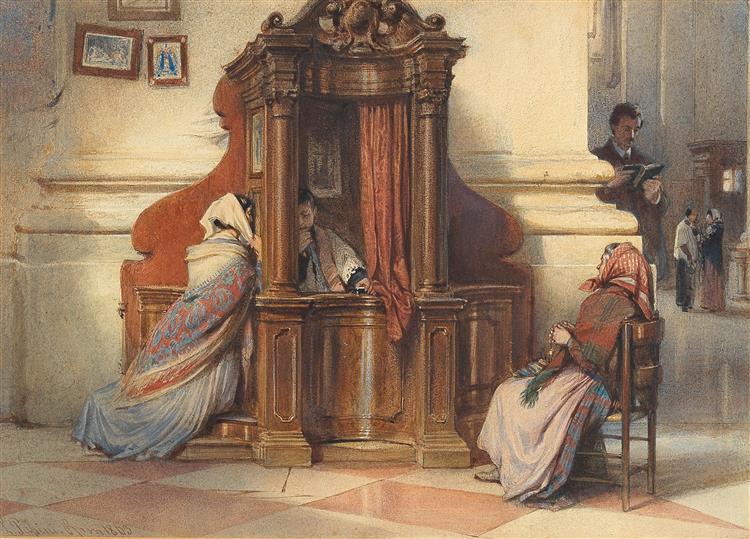Some stories in the news recently have led to a controversy over the confidentiality of information divulged during the Sacrament of Reconciliation. Such confidentiality is known as “the seal of the confessional,” or “clergy-penitent privilege.” The controversy concerns whether it is advisable, or even constitutional, to legally require priests to report to the police any information they have heard in the confessional, if that information relates to the sexual abuse of children.
The states of Washington and Vermont are deliberating on whether to repeal their civil laws that protect the seal of the confessional. In response, Bishop Thomas Daly of the Diocese of Spokane, Washington, told the Washington Examiner, in an interview this week, that Catholic clergy would refuse to comply if the bill (HB 1098) proposed in the state legislature is enacted –LifeSite News, March 3.
The Confidentiality of the Confessions is non-negotiable
Bishop Thomas Daly’s declared that, if such legislation were enacted, he would go to jail rather than break the seal of the confessional. He added that he was confident that his fellow Catholic clergymen would all do the same. Furthermore, Bishop Daly affirmed that “the integrity of the sacraments is non-negotiable.”
According to the March 8 edition of America Magazine, the States of Washington and Delaware will decide within a few weeks whether the bill will become law.
Also, in Wilmington, Delaware, Bishop Koenig of Wilmington stated that the seal of the confessional will not be broken “under any circumstances,” despite the proposed legislation against the sacraments. – LifeSite News, Mar 9.
The Delaware News (March 8) says a decision will be made within a few weeks on whether this bill will become law.
In both cases, it appears that the information has not yet been updated since March 8.
In 2019, the California legislature attempted to enact a law that would have required priests to become mandatory reporters of certain kinds of information heard in the confessional. That attempt failed. Based on precedent, I expect this year’s attempts to fail as well, but I am not convinced that somebody will not try the same thing again someday. There is a strong possibility that similar attempts to hinder the work of priests will find their way into legislatures in the future.

Ludwig Passini
Is the Seal of the Confessional Unnecessary?
On the other hand, a certain priest supported the idea of revoking the clergy-penitent privilege. The following is a summary of the story:
Fr. James E. Connell, a retired Catholic priest from Milwaukee, Wisconsin, wrote an editorial in which he supported the idea of revoking clergy-client privilege. Wisconsin Archbishop Jerome Listecki lamented the disturbing words of Fr. Connell, and stripped him of all faculties to administer the sacrament of reconciliation.- LifeSite, Mar 23.
The right to administer the Sacrament of Reconciliation comes from a priest’s archbishop or bishop; therefore, Fr. Connell will no longer be able to hear confessions in any Catholic diocese in the world. If Fr. Connell (or any other priest) were to break the seal of the confessional, he would incur automatic excommunication.
The Sacrament of Reconciliation (or Confession), in which one confesses one’s sins to God through a priest, is different from what the world considers “confession” to a person. Forgiveness of sins involves the salvation of a soul. Some priests have been martyred for not revealing the sins of penitents. And any priest who, under any circumstances whatsoever, reveals information heard during a confession, incurs automatic excommunication.
I believe that Archbishop Listecki’s revocation of the faculties of Fr. Connell was also intended to eliminate the risk of his excommunication. And I hope that the confidence of the faithful that the content of their confessions will remain secret will encourage them to receive more frequently the sacrament that is the salvation of their souls.
Lawyers Consider Legislation to Mandate Reporting of Confessions
In an article published by the Ethics and Public Policy Center, Eric Kniffin, an outstanding First Amendment lawyer who has defended the rights of over 300 religious and other groups, points out three major problems with the proposed laws in Washington State, Vermont, and Delaware, namely:
1) The proposed laws incorrectly presume that the government could coerce priests to break the seal of the confessional. In reality, if these laws were passed, the result would not be priests “turning State’s evidence;” the result would be priests in jail.
2) The proposed laws incorrectly presume that breaking the seal of the confessional would make children safer. In reality, if these laws were passed, abusers (and other sinners as well) would tend to stay away from confession. Children would be less safe as a result.
3) The proposed laws discriminate against religion. The proposed laws attack clergy-penitent privilege (i.e. the seal of the confessional), but they make no mention of attorney-client privilege (lawyers do not reveal what their clients tell them). In other words, according to the proposed laws, secrecy is OK if it is for secular reasons, but it is not OK if it is for religious reasons. That is discrimination against religion, which is unconstitutional.
Kniffin concludes by quoting Boston Globe columnist Jeff Jacoby, who recently wrote, “Protecting children is a matter of crucial importance. Protecting religious faith is too. It isn’t the job of lawmakers to privilege one of those worthy aims over the other. It is to strive, with care and respect, to do both.”
Freedom of religion is important for everyone. In a society that forces priests to choose between excommunication and arrest, no one is truly free.
Revealing the Content of Confessions
As mentioned earlier, what is said in the confessional is strictly confidential.
Two years ago, a book was published that comes close to exposing such confessional confidentiality, namely: Je Vous Pardonne Tous vos Péchés (I Forgive All Your Sins) by Vincent Mongaillard, France. The book is a collection of true stories, provided by 40 priests, about confessions that they have heard. Both priests and penitents remain anonymous; one priest who was interviewed for the book explained that, in order to avoid violating Church law, all personal details of the confessions were changed.
Some excerpts were translated and published by Harper’s Magazine; they range from the comical confessions of a couple in their fifties to the regret one priest felt after giving absolution to a criminal. My impression (based solely on the excerpts I read) is that most of the confessions seem to be about common errors people make (many of them, for example, involve marital infidelity).
Even if the book does not violate Church law, I still feel that the dignity of the Sacrament of Reconciliation would be better served by concealing such stories than by revealing them.
A point made by a priest about the Sacrament of Reconciliation
In an interview on LifeSite News, Michel Rodrigue, a priest also known as a mystic, was talking about the Spiritual War are facing. He emphasized the importance of receiving the Sacrament of Reconciliation along with prayer. Regarding the Sacrament of Reconciliation, Fr. Rodriguez gave the following advice:
1) Confess both mortal and venial sins.
2) Confess sins of omission, that is, the things that you should have done but did not do.
Until now, I have not paid much attention to 2), the things I should have done but did not do. However, it occurred to me that the simple fact that I didn’t do some things — things that might be considered duties, or things merely advisable — could be a sign of sloth, which is one of the seven deadly sins.
I realized that just because I am working and keeping myself busy, that does not mean that I am free from sloth. Sloth is the sin of spiritual laziness, which is difficult to become aware of, and troublesome to deal with, without the grace of God.
It is said that, since Vatican II, the number of people going to confession has decreased. I have experienced many times that my mind and body have become lighter after receiving the Sacrament of Reconciliation. I am not the only one. A formerly Protestant acquaintance of mine told me that after he converted and made his first confession, when he received sacramental absolution the first time, he felt a sense of exhilaration and lightness, as if a huge load had literally been lifted from his back.
Mother T. always told me how important it was to pray and receive the Sacrament of Reconciliation. We should not miss out on the benefit of being offered such a powerful sacrament.
The Seal of the Confessional and Religious Freedom
In the United States, the rift between State and Church is growing ever larger. As mentioned earlier, the biggest problem is the pressure that threatens the religious freedom of the Church. Pressures include laws that would force Catholic hospitals to perform abortions, laws that would make Church-affiliated organizations pay for contraceptives used by their employees, laws that would force Catholic adoption agencies to place children with same-sex couples, and (now) proposed laws that would revoke clergy-penitent privilege.
When people talk about requiring priests to break the seal of the confessional, it reminds of me of people who support the “ordination” of women; in both cases, they are talking about something that is quite simply impossible. Just as, in 1994, Pope John Paul II declared that “the Church has no authority whatsoever to confer priestly ordination on women,” so it is in this case, with respect to the revoking of clergy-penitent privilege: the Church has no authority to do it. The seal of the confessional is not only Church law, it is “God’s teaching;” even if the Pope himself wanted to change it, he could not.
The secular state, however, is not going to readily accept the fact that the Church has rights independent of it.
The real purpose of bringing up the language of “child sexual abuse” in regard to this issue is to sway people’s emotions, and blind their eyes to the fact that the proposed laws seek to change a thing that cannot, in fact, be changed. The proposed laws are not really about preventing child abuse. They are nothing less than an attack on freedom of religion, an attack on the sacraments, and an attack on the Church.

